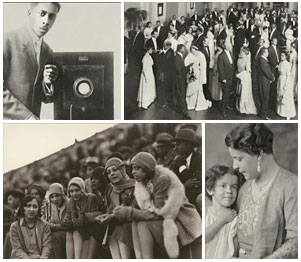“The Scurlock Studio and Black Washington: Picturing the Promise” Photography Exhibition Opens at the Smithsonian Jan. 30


NorthStarNews.com is proud to announce a partnership with the National Museum of African American History and Culture (NMAAHC) of the Smithsonian Institution. Through this partnership, NorthStarNews.com will share the museum's rich collection and exhbits online with the larger community. We will also bring you periodic updates on the programs of the National Museum of African American History and Culture and chart the progress of the construction of the museum's permanent home on the National Mall in Washington, D.C.
Nearly a century’s worth of photographs from the renowned Scurlock Studio form the backbone of a new exhibition designed to celebrate the legacy of a noted family of photographers and to present a vivid portrait of black Washington, D.C., in all its guises—its challenges and its victories, its dignity and its determination.
“The Scurlock Studio and Black Washington: Picturing the Promise,” a collaboration between the National Museum of African American History and Culture and the National Museum of American History, opens Jan. 30 and will be on view through Nov. 15, 2009. It features more than 100 images created by one of the premiere African American studios in the country and one of the longest-running black businesses in Washington; included are cameras and equipment from the studio and period artifacts from the Greater Washington area.
The exhibition is the first to be presented in the National Museum of African American History Culture Gallery, which is located in the newly renovated National Museum of American History. The museum will use this space until its building opens on the National Mall in 2015.
Beginning in the early 20th century and continuing into the 1990s, Addison Scurlock, followed by his sons, Robert and George, used their cameras to document and celebrate a community unique in the world. They captured weddings, baptisms, graduations, sporting events, civil protests, high-society affairs and visiting dignitaries. It was for portraiture, however, that the Scurlocks became renowned; they continue to be recognized by scholars and artists as among the very best of 20th century photographers who recorded the rapid changes in African American urban communities nationwide.
Among the portraits’ subjects are luminaries such as Marian Anderson, Duke Ellington, Ralph Bunche, Mary McLeod Bethune and Muhammad Ali. Many of the photographs show Washington as the mecca for leaders in African American business, culture and higher education long before New York City’s Harlem. They depict successful businesses such as the Underdown Delicatessen, prominent churches such as the Lincoln Temple, myriad community and leisure events such as a summer outing at Highland Beach in Maryland and sporting events at Howard University’s Griffith Stadium. The images are drawn from the Scurlock Studio Collection, preserved since 1997 at the Archives Center in the American History Museum and will be displayed with cameras and other photographic equipment from the Scurlock Studio.
Also on view will be items from the National Museum of African American History and Culture’s Black Fashion Museum Collection, and artifacts from Howard University, the Historical Society of Washington, D.C., and the Scurlock family. Among the featured items is the fur coat worn by Marian Anderson during her concert on the steps of the Lincoln Memorial, an event photographed on Easter Sunday of 1939 by Robert Scurlock. The coat is from the collection of the Smithsonian’s Anacostia Community Museum.
Co-curators of the exhibition are Michelle Delaney, associate curator of the Photographic History Collection at the National Museum of American History and Paul Gardullo of the National Museum of African American History and Culture. The exhibition’s richly illustrated, 224-page catalog is available from Smithsonian Books for $35.
The National Museum of African American History and Culture was established in 2003 by an Act of Congress, making it the 19th Smithsonian Institution museum. It is the only national museum devoted exclusively to the documentation of African American life, art, history and culture. The Smithsonian Board of Regents, the governing body of the Institution, voted in January 2006 to build the museum on a five-acre site on the National Mall. The Constitution Avenue site is adjacent to the Washington Monument and across the street from the Smithsonian’s National Museum of American History. For more information, visit www.nmaahc.si.edu or call (202) 633-1000, (202) 633-5285 (TTY).
The National Museum of American History collects, preserves and displays American heritage through exhibitions and public programs about social, political, cultural, scientific and military history. Documenting the American experience from Colonial times to the present, the museum looks at growth and change in the United States. For more information, visit the museum’s Web site at http://americanhistory.si.edu or call (202) 633-1000; (202) 357-1729 (TTY).
The museum is located at 14th Street and Constitution Avenue, N.W., and is open daily from 10 a.m. to 5:30 p.m. except Dec. 25. Admission is free.









